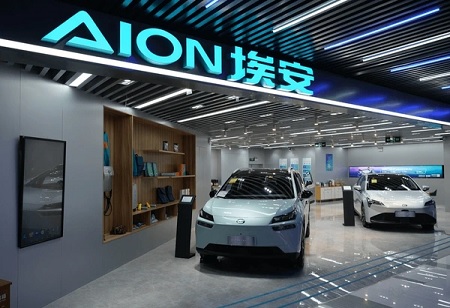
Aion Eyes Indonesia for EV Plant, Challenges BYD in Southeast Asia Market

 Aion, the electric vehicle (EV) division of China's state-owned GAC Group, announces intentions to construct its second plant in Southeast Asia within Indonesia, aiming to expand its presence in the burgeoning market and compete with local competitors such as BYD. Teaming up with Jakarta-based carmaker Indomobil Group, Aion aims to localize production and establish a robust supply chain, providing Indonesian consumers with a diverse range of cutting-edge new-energy vehicles.
Aion, the electric vehicle (EV) division of China's state-owned GAC Group, announces intentions to construct its second plant in Southeast Asia within Indonesia, aiming to expand its presence in the burgeoning market and compete with local competitors such as BYD. Teaming up with Jakarta-based carmaker Indomobil Group, Aion aims to localize production and establish a robust supply chain, providing Indonesian consumers with a diverse range of cutting-edge new-energy vehicles.
The company's inaugural Southeast Asia factory, scheduled to commence operations in Thailand this summer upon completion of its initial construction phase, targets an annual capacity of 50,000 units following a second-phase expansion. Founded in 2017 by GAC Group, a key partner of Toyota and Honda in China, Aion has not disclosed a timeline for the commencement of the second phase of construction. A wave of Chinese EV manufacturers has been drawn to Southeast Asia, either establishing their own manufacturing facilities or marketing their Chinese-made vehicles, driven by escalating demand for electric cars.
The world’s largest EV maker BYD, mainland China’s largest sport-utility vehicle maker Great Wall Motor, the state-owned partner of Ford Motor and Mazda Motor Changan Automobile and EV start-up Hozon New Energy Automobile are setting up production facilities in countries like Indonesia and Thailand to build right-hand-drive cars for the region’s market. China, the world’s largest EV market, is crowded with more than 200 licensed EV makers of all shapes and sizes as competition escalates this year amid heightening worries about overcapacity. At present, six out of 10 new electric cars worldwide are sold in mainland China.
Prominent contenders have been ramping up efforts to expand internationally since last year, with Southeast Asia emerging as a pivotal foreign market amidst stringent regulations on Chinese-produced electric vehicles in the United States and Europe. Following an anti-subsidy inquiry initiated by the European Commission in September, higher tariffs than the standard 10 percent are anticipated to be imposed on Chinese-manufactured electric cars.
Car sales in Southeast Asia experienced a 2.1 percent decline in 2023, dropping to 3.36 million from the previous year's 3.43 million. Aion's sales of electric vehicles to Chinese consumers surged by 77 percent in the same period, reaching 480,003 units compared to the figures from 2022. Additionally, the company disclosed plans to initiate sales of Aion vehicles in Indonesia by June, coinciding with the unveiling of two sport-utility models, the Aion Y Plus and Hyper HT, at the Gaikindo Indonesia International Auto Show.

